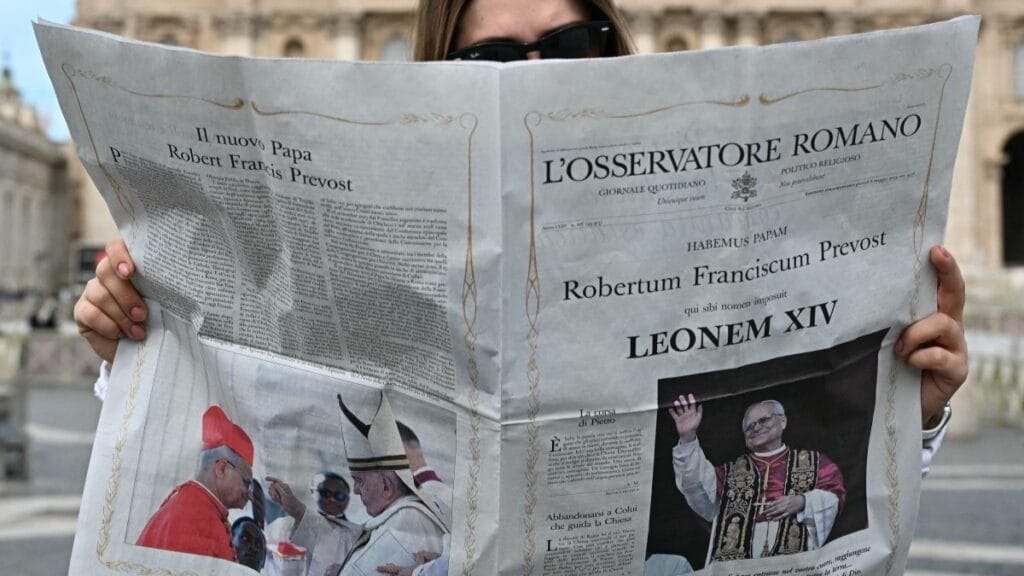'Papa Americano'
The announcement of a world first - an American pope, would shock all. In a time in which America’s crown seems to be slipping, could this move be a necessary saviour?

America Dons the Papal Robes - What Does this Mean for America's Global Image?
As the white smoke rose from the Sistine Chapel following two days of deliberation, the announcement of a world first - an American pope, would shock all. Pope Leo XIV, or Chicago-born cardinal Robert Prevost, would succeed Argentinian Pope Francis on the 8th of May 2025, making him the 267th pope, and the first American. The immediate response was telling - one video from the site captures the confusion of the crowd: the whispered hushes of ‘Americano?’ rolling over in a wave. With this announcement we found ourselves in uncharted waters. Never before, in this long standing tradition, had a Pope’s decrees been voiced in an American accent, a ‘Chicago drawl’. It seemed to challenge the very tradition of it all - the ritual of the process, the mystery, juxtaposed with the bluntness of the American identity. America, the antithesis of everything European: challenging their traditions, their afternoon espresso, their late night dinners, now sitting on the throne over it all. To many, this ‘Yank on the throne of Saint Peter’ seemed akin to the blasphemy of slapping a McDonald's down right in the middle of the Vatican. Rather than a religious, mysterious figure, this guy seemed painfully ordinary: he had eaten deep dish pizza, gone to an American highschool, and taken the subway. What could an American, from a notoriously politically minded nation, possibly know about leading the world’s largest church, and facilitating the religious journey of one billion Catholics worldwide?
While Europeans stood by in shock, Americans scrambled to claim him as their own, a representation of American victory over yet another sect of society. This reclamation of nationalist identity was much needed, particularly during the recent period in which the American identity was less than desirable. Meanwhile, non-Americans attempted to rationalise and downplay his identity, dubbing him the “least American of all Americans”, citing his time spent as a missionary in Peru. If an American had to be on the throne, he would be the least American, most culturally ‘diverse’ as possible, goddammit! These opinions stemmed perhaps from fears that an open acceptance of an American pope would also mean an acceptance of American values rather than the typical expectations of a pope: a vision of peace and a breath of fresh air from political discussion.
The decision is tinged with the irony of America’s current image on the global stage. After all, why now, after 2,000 years, had an American taken the throne? Many questioned this move’s implications, contemplating whether the political climate had influenced the cardinals’ decision. Had it been simply too appealing for them to resist? Many also questioned whether this signified a move towards a world in which America rules over not only the world’s politics, but also the religious landscape, forcing them to confront the future of papacy and the implications of an American pope. As one source put it, the Catholic church had previously held the role of ‘balancing against American global power’, and the existence of an American pope therefore challenged this status quo. To many, America seems too deeply intertwined with politics for an American pope to exist without political opinion or influence. Would this signify the further merging of politics with religion? The contradiction of America, the world’s bratty teenager, ruling over a centuries-old institution, bordered on the theatrical. In the current era we find ourselves in, in which the political landscape seems to only grow in absurdity, perhaps the similar absurdity of this decision seems fitting.
However, for Trump and JD Vance at least, this ‘shepherd to guide America back to global victory’, would not be. The new Pope has wasted no time in ensuring that his views on American politics are made clear, taking a public stance against JD Vance in particular. He seems willing to simultaneously reject his past identity and adopt his new one: From ‘Robert Prevost’, Chicago native, to Pope Leo XIV, head of the Catholic church. In an address to Rome during evening mass yesterday, he stated, “Today I can say in a special way that I am Roman, with and for you”. For many, this was an exciting shift. Could this instead serve as an ‘antithesis’ to Trump, balancing the American voice? Is this the necessary American ‘good cop’ to Trump’s ‘bad cop’? Perhaps this could signify a positive shift in America’s global image, replacing past images of the politician, the businessman, the banker. As written in Time Magazine, “In a society that often equates American influence with might or money or celebrity, now our foremost representative is a humble man in white robes, preaching love, justice and mercy”. It’s a “cultural watershed” for the United States. In a time in which America’s crown seems to be slipping, and its fall imminent, could this move be a necessary saviour; the ‘phoenix rising from the ashes of a burning America’? Would this change the global American identity or would it signify a further shift towards conservatism? Will this newfound image have the intended effect in restoring America’s cultural image, or will it instead destroy the ‘sanctity’ of the papal process, blowing through its smoke and mirrors? Only time will tell. One thing is for sure, at least for Italians; this election process has changed the meaning of ‘Papa Americano’ for good.





